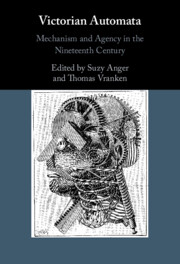
- Publisher:
- Cambridge University Press
- Online publication date:
- March 2024
- Print publication year:
- 2024
- Online ISBN:
- 9781009110129
- Subjects:
- Literature, English Literature 1830-1900

The relationship between lifelike machines and mechanistic human behaviour provoked both fascination and anxiety in Victorian culture. This collection is the first to examine the widespread cultural interest in automata – both human and mechanical – in the nineteenth century. It was in the Victorian period that industrialization first met information technology, and that theories of physical and mental human automatism became essential to both scientific and popular understandings of thought and action. Bringing together essays by a multidisciplinary group of leading scholars, this volume explores what it means to be human in a scientific and industrial age. It also considers how Victorian inquiry and practices continue to shape current thought on race, creativity, mind, and agency. This title is part of the Flip it Open programme and may also be available Open Access. Check our website Cambridge Core for details.
‘This fascinating and thoroughly readable collection invites us into the longer histories of our own encounters with driverless cars and artificial intelligence. Revealing just how central the automaton was to nineteenth-century intellectual life, these wide-ranging essays make an invaluable - and timely - contribution to our understanding of the period, from its theories of consciousness, racial difference, and labour, to its debates over instinct and agency.’
Tina Young Choi - Professor of English, York University
‘Like us, Victorians confronted new machines that seemed to do things only humans could do. What did automata mean for that earlier technological and cultural age? This outstanding collection contributes revealing new critical perspectives and topics - including detective fiction, hypnotism, and law; gender, evolution, and race - to the tortuous history of human–machine relations.’
John Tresch - Professor of History of Art, Science, and Folk Practice, Warburg Institute, University of London
‘Suzy Anger, Thomas Vranken, and their collaborators make a much needed contribution to the field that has sometimes facetiously been dubbed ‘automaton studies.’ Offering a wide range of case studies and insights, they succeed simultaneously in portraying what is distinctive about automata and automatism in the Victorian age, and in inviting us to tackle time-honoured questions about humans, machines, volition, and coercion.’
Heidi Voskuhl - Associate Professor of History of Science, University of Pennsylvania
‘An impressive volume of essays that explore the many guises of automata in the nineteenth century … This is an engaging and highly readable collection with much of interest for those in the field.’
Jessica Thomas Source: The British Society for Literature and Science
 Loading metrics...
Loading metrics...
* Views captured on Cambridge Core between #date#. This data will be updated every 24 hours.
Usage data cannot currently be displayed.